Articles Menu
Feb 22, 2021
On Valentine’s Day, a small group of Wet’suwet’en people gathered outside a Coastal GasLink pipeline work camp in northwest B.C. to hold a ceremony to remember Missing and Murdered Indigenous Women and Girls. They chose the site because of the connection between work camps and violence against Indigenous women.
It was a Sunday and no work was happening, which they confirmed with a Coastal GasLink employee before starting the ceremony. But just moments after starting, Coastal GasLink security officers approached the group, asked them to leave and said they were going to call the police, according to Sleydo’ Molly Wickham, a supporting chief in the Cassyex House of the Gidimt’en Clan. A security officer recorded the entire ceremony, she said, and when they left, security and police were waiting on the road, watching as the group left the site.
The police and security presence on Wet’suwet’en territory has been constant since last February, when heavily armed RCMP descended on the Morice River forest road to enforce a Coastal GasLink injunction against land defenders who were blocking work on the pipeline. Twenty-eight people were arrested, including matriarchs. Today, the territory is still monitored daily by police and private security officers, despite calls from the United Nations Committee on the Elimination of Racial Discrimination for police and security forces to withdraw.
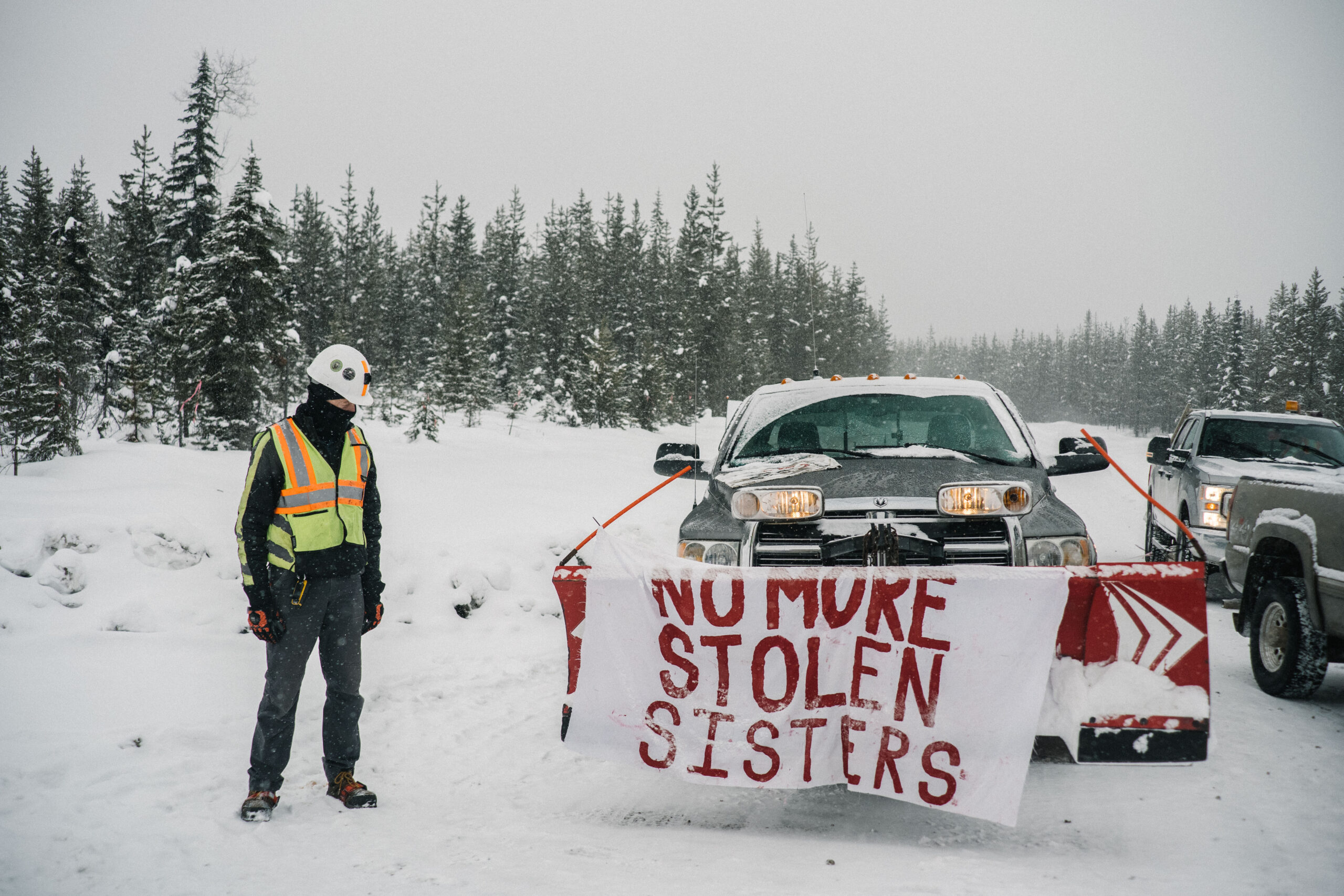
A Coastal GasLink worker looks at a sign hung by land defenders as part of a Feb. 14 ceremony to remember Missing and Murdered Indigenous Women and Girls. Photo: Michael Toledano
“I just get so mad and frustrated because we’re living with it every day,” said Wickham, who lives with her family in a cabin on the territory and is the spokesperson for the Gidimt’en Checkpoint, one of the sites of the police raids. “They’re patrolling all the roads. You could get pulled over at any point in time for no reason at all. If you go anywhere, they’re going to follow you.”
Jeffrey Monaghan, an associate professor at Carleton University’s Institute of Criminology and Criminal Justice and co-author of Policing Indigenous Movements, told The Narwhal there’s systemic racism in the RCMP and the “localized harassment” happening on Wet’suwet’en territory is common.
“I would characterize it as petty, retaliatory attacks,” he said.
The United Nations Committee on the Elimination of Racial Discrimination has been calling on Canada to withdraw police and security forces from traditional lands since 2019. It has also been calling on the government to stop construction on the Coastal GasLink pipeline — as well as the Trans Mountain pipeline and the Site C dam — until it receives free, prior and informed consent from First Nations.
Before the arrests last year, the committee issued a decision statement, which is an official call for urgent action, saying it is disturbed by the “forced removal, disproportionate use of force, harassment and intimidation by law enforcement officials against Indigenous Peoples who peacefully oppose large-scale development projects on their traditional territories.”
It called on Canada to “guarantee that no force will be used against the Wet’suwet’en and guarantee that the Royal Canadian Mounted Police and associated security and policing services will be withdrawn from their unceded traditional lands.”
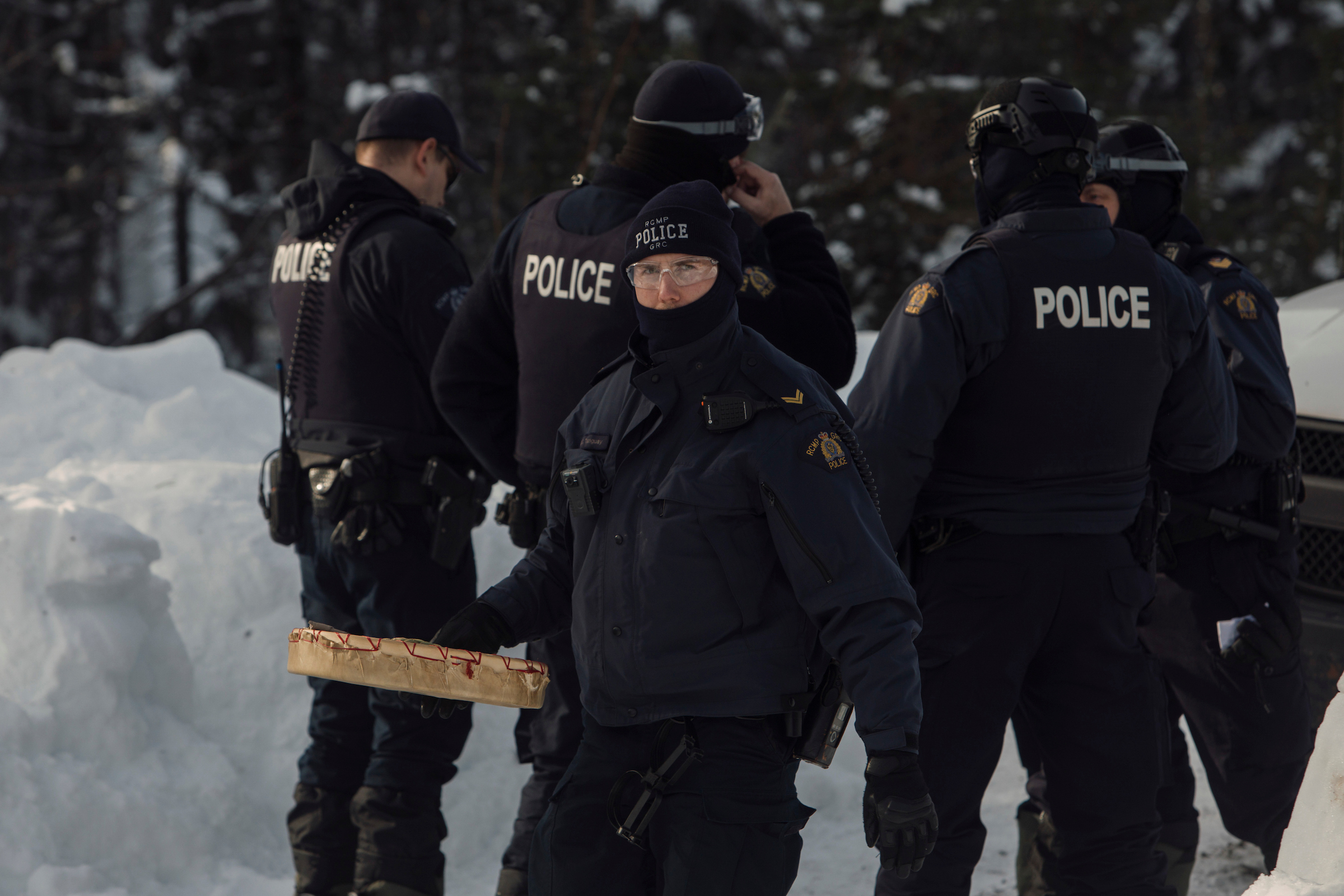
An RCMP officer holds a land defender’s drum during the February 2020 raids of Wet’suwet’en camps, which were intentionally situated to block work on the Coastal GasLink pipeline. Photo: Amber Bracken / The Narwhal
Amnesty International echoed the committee’s concerns in a statement and said when Canada committed to reconciliation, the government said it would respect and protect Indigenous Rights.
“If promises to do so are not met with concrete action, including tough and challenging decisions such as those required here, then the words remain empty.”
“Canada has consistently failed to take appropriate measures to combat and eliminate all forms of discrimination against Indigenous Peoples.”
In November, the UN committee reiterated its requests in a letter to Canada’s permanent representative to the UN office in Geneva, stating the federal government “has provided no information on measures taken to address the concerns raised by the committee.”
Wet’suwet’en Hereditary Chiefs have also been calling for the police to get off their land. Following the 2020 arrests, the RCMP agreed to remove the temporary detachment it set up on the Morice River forest service road, the main access road to the Coastal GasLink work site.
However, in late November, the RCMP re-established the detachment, which is known as the Community-Industry Safety Office. In an email to The Narwhal, RCMP spokesperson Cpl. Madonna Saunderson said the intent was to reduce the chances of COVID-19 exposures between local RCMP officers and members of the RCMP’s quick response team, which is composed of officers from across the province.
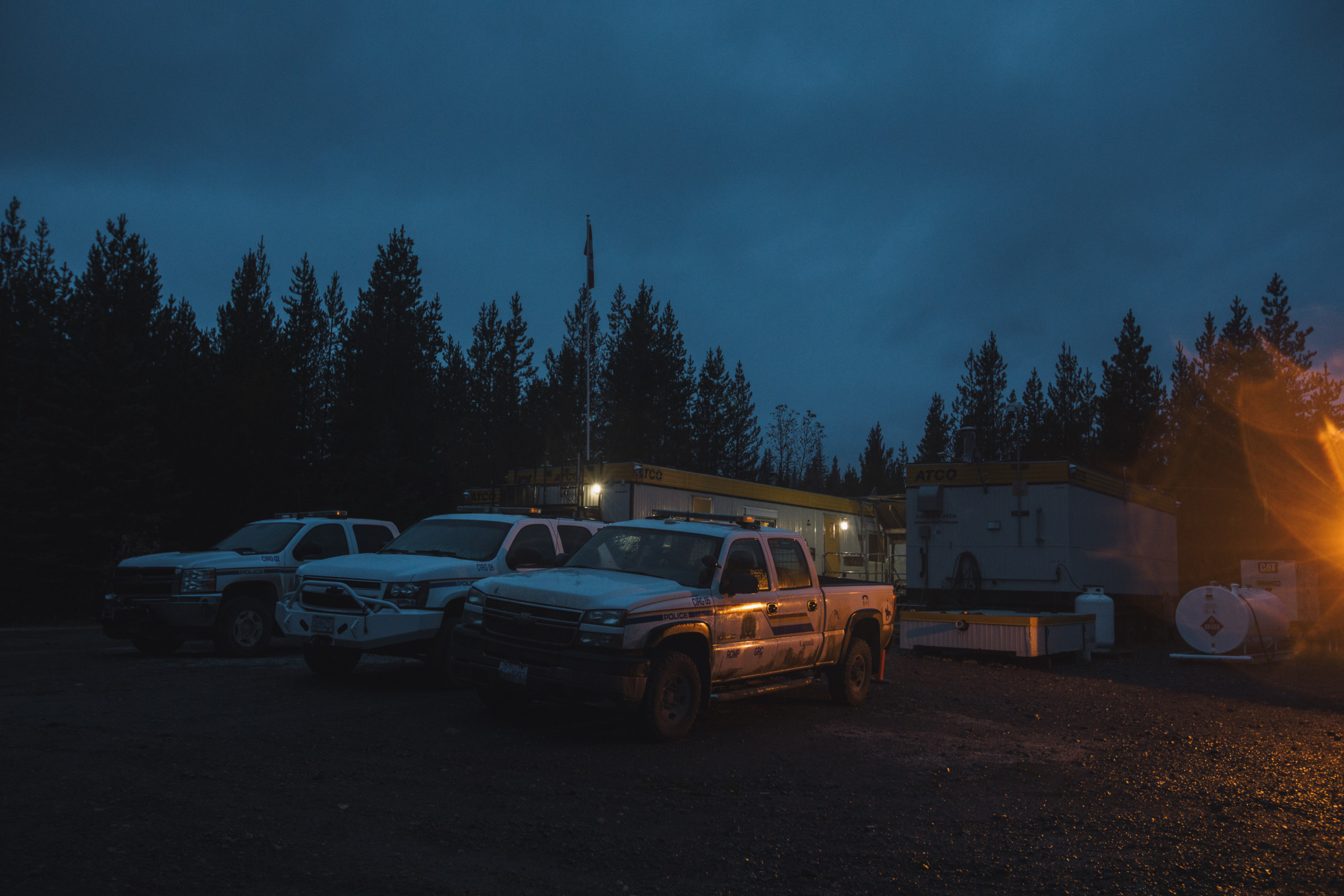
A temporary RCMP detachment on the Morice River forest service road was closed in February 2020, following the arrests of land defenders and at the request of Wet’suwet’en Hereditary Chiefs. However, it reopened in November to prevent transmission of COVID-19 between local officers and members of the RCMP’s quick response team. Photo: Amber Bracken / The Narwhal
Saunderson would not divulge information on how many officers are assigned to the unit, citing operational reasons.
Wickham said based on her observations, there are six or seven vehicles on duty per shift, with two officers assigned to each vehicle. She said she has also seen a canine unit on the territory and believes the RCMP have access to armored vehicles, snowmobiles and ATVs.
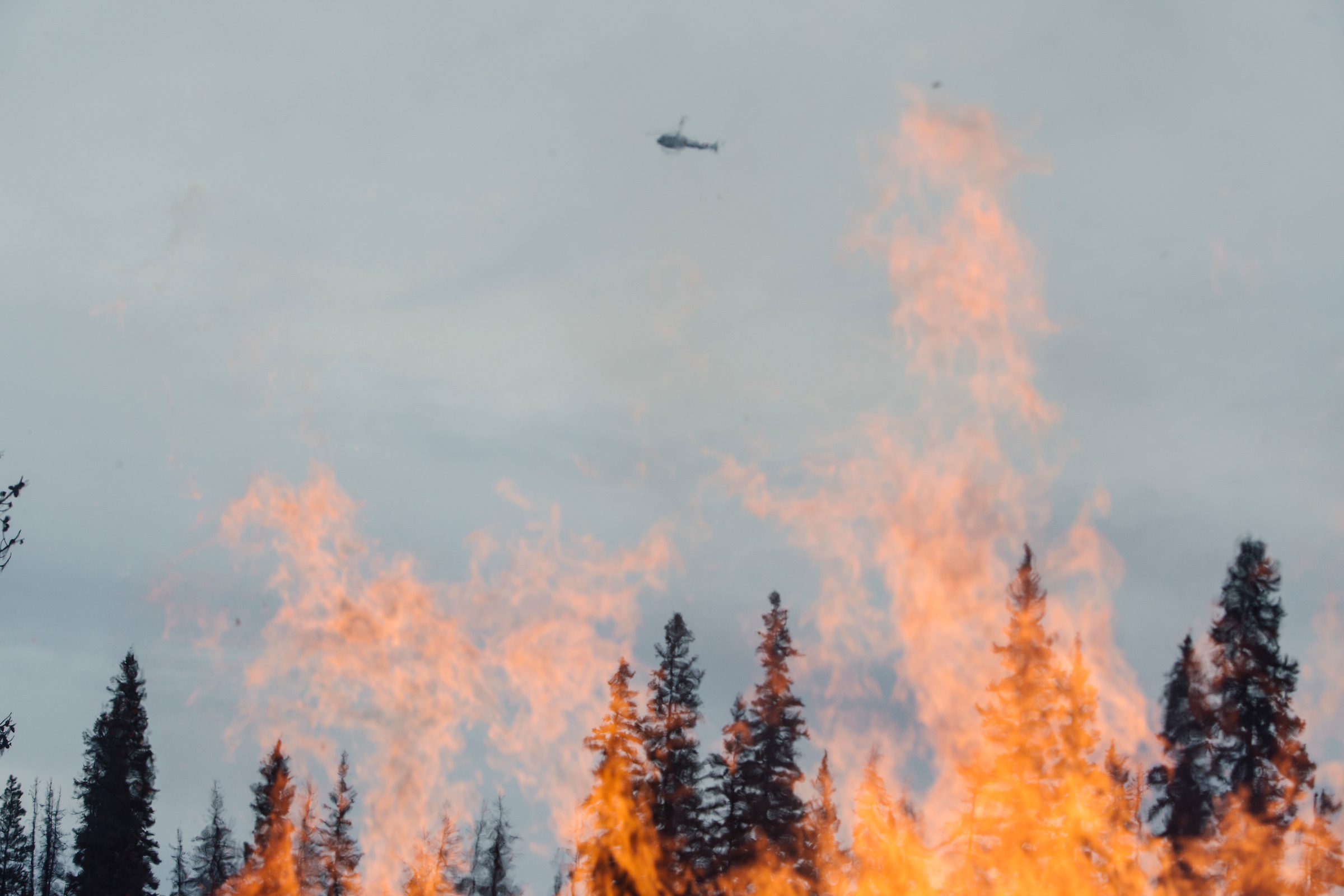
A helicopter flies overhead during the February 2020 raids of Wet’suwet’en camps blocking working on the Coastal GasLink pipeline. More than a year later, RCMP patrols of the territory continue, with land defenders saying officers have access to armored vehicles, snowmobiles and ATVs. Photo: Amber Bracken / The Narwhal
Saunderson said the unit’s mandate is to “conduct safety check stops for compliance” with laws and regulations. She stressed that check stops are conducted at major intersections and include industry traffic.
The RCMP aren’t alone in policing the territory. TC Energy, the company behind Coastal GasLink, employs multiple private security forces, according to Wickham. She said one is Forsythe Security, a company that specializes in working for the oil and gas industry. The company is operated by a retired RCMP officer, Warren Forsythe. According to Canada’s National Observer, Forsythe worked for Kinder Morgan during 2018 protests against the Trans Mountain pipeline.
Coastal GasLink did not respond to requests for interviews or information. In an email, a Forsythe representative said it does not discuss companies it may or may not work for.
In addition to stopping Wet’suwet’en people on the territory, the RCMP has recently started serving vehicle inspection notices, according to Wickham. Anyone who receives a notice has to take their vehicle into an approved mechanic for a full inspection and fix anything noted on the report.
“Most of the stuff is not mechanical,” she said, explaining that a full vehicle inspection will note minor damages like chips in the windshield. She said an inspection costs around $200 and a second inspection is required to confirm the repairs have been made. As a result, she said, the inspections are costing community members thousands of dollars and three people have already had to take their vehicles off the road.
According to Monaghan, this a common police tactic used against activists.
“If you did those kinds of vehicle patrols in affluent neighbourhoods, you’d find all kinds of stuff,” he said in an interview. “You could get people on this anywhere, but if you only enforce it in one community, then that is really oppressive.”
Wickham believes the recent tactics are designed to prevent opposition to the pipeline from growing. “They’re scared of any build up like it turned into last year,” she said.
Monaghan said the only action an individual can take against police activity like random stops and inspections is to file a lawsuit or a complaint with the Civilian Review and Complaints Commission for the RCMP, both of which would take years to complete.
For example, it took seven years for the commission to wrap up a review of RCMP policing during the 2013 Elsipogtog Mi’kmaq First Nation anti-fracking protests in New Brunswick. The commission concluded that random stop checks and searches were “inconsistent with the charter rights of the vehicle occupants.”
The British Columbia Civil Liberties Association, Wet’suwet’en Hereditary Chiefs and the Union of British Columbia Indian Chiefs wrote a letter to the commision prior to the 2020 arrests, expressing concerns about RCMP activity on Wet’suwet’en territory police and requesting a formal investigation.
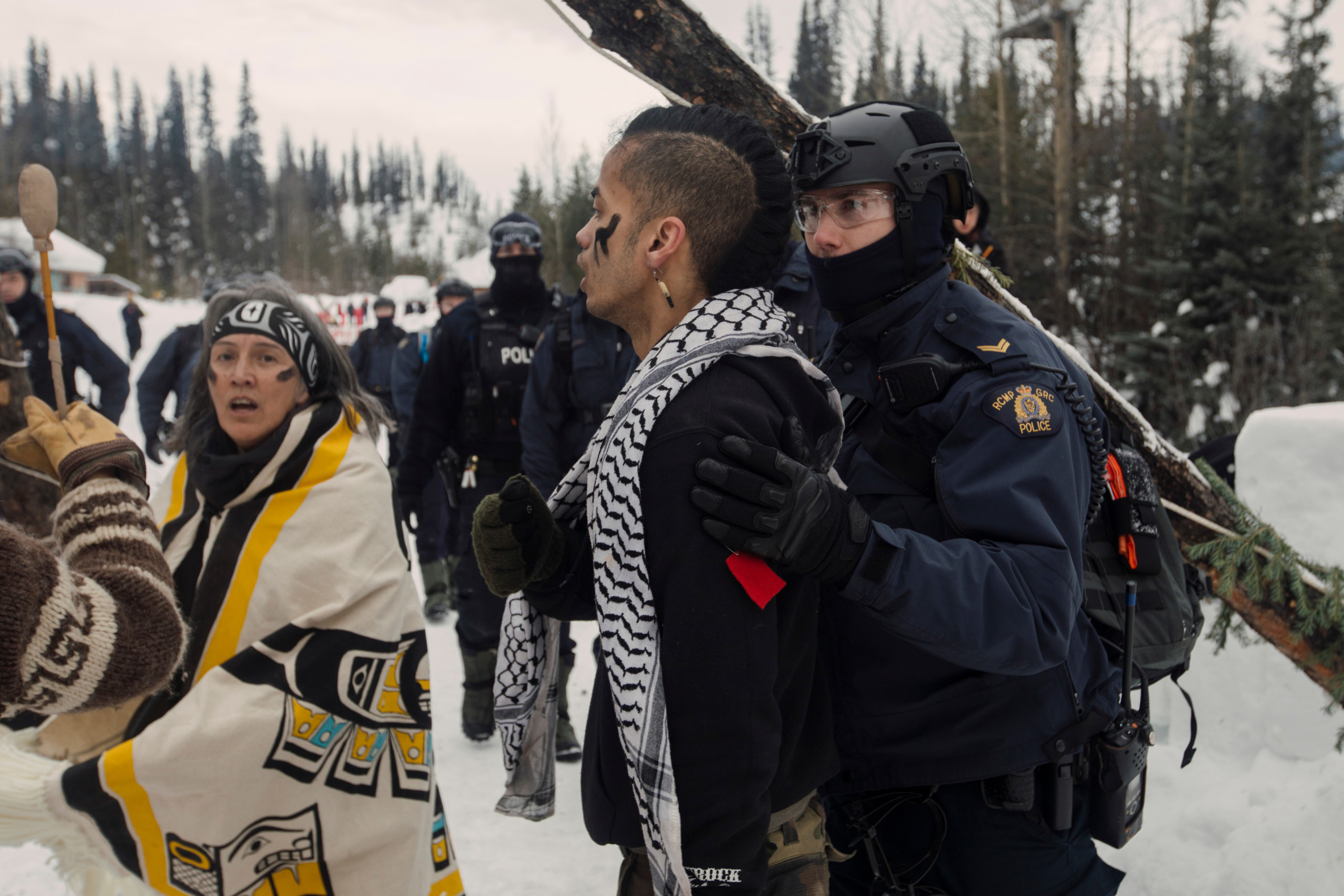
The Civilian Review and Complaints Commission for the RCMP said the police raids of Wet’suwet’en camps in February 2020, shown here, were reminiscent of how the RCMP responded to Elsipogtog Mi’kmaq First Nation anti-fracking blockades in New Brunswick in 2013. Photo: Amber Bracken / The Narwhal
In a response letter sent a few days after the arrests, the commission agreed that many of the policing activities on Elsipogtog and Wet’suwet’en territories bore a striking resemblance. It said, however, it would not conduct a formal investigation on the grounds that it had “already provided extensive guidance” to the RCMP through its review of the 2013 protests. The guidance included “12 recommendations on a variety of topics related to the policing of protests, particularly with regard to Indigenous-led protests.”
Monaghan called the commission a “toothless organization” and said despite 20 years of critical media coverage of policing of Indigenous communities, very little has changed.
“We’re stuck with this system where there’s not really much an everyday person can do if they have a shitty run-in with the police.”
Earlier this month, while on assignment for Al Jazeera for a story about Missing and Murdered Indigenous Women and Girls, journalist Brandi Morin and photographer Amber Bracken were driving on the Morice River road when they were waved over to a pullout by RCMP officers. An industry truck was parked beside the unmarked police vehicle and when they pulled in, the industry truck drove in a circle around both vehicles and left.
“It was almost like he was corralling us in,” Morin said in an interview. “It was really strange.”
Morin, who is Métis, told The Narwhal the officer asked them their names and why they were there. She said the whole situation made her nervous, especially given her Indigeneity and the remoteness of the location. The exchange was brief and the police left. A few minutes after Morin and Bracken started down the road, the unmarked vehicle appeared behind them and followed them for the next 30 minutes.
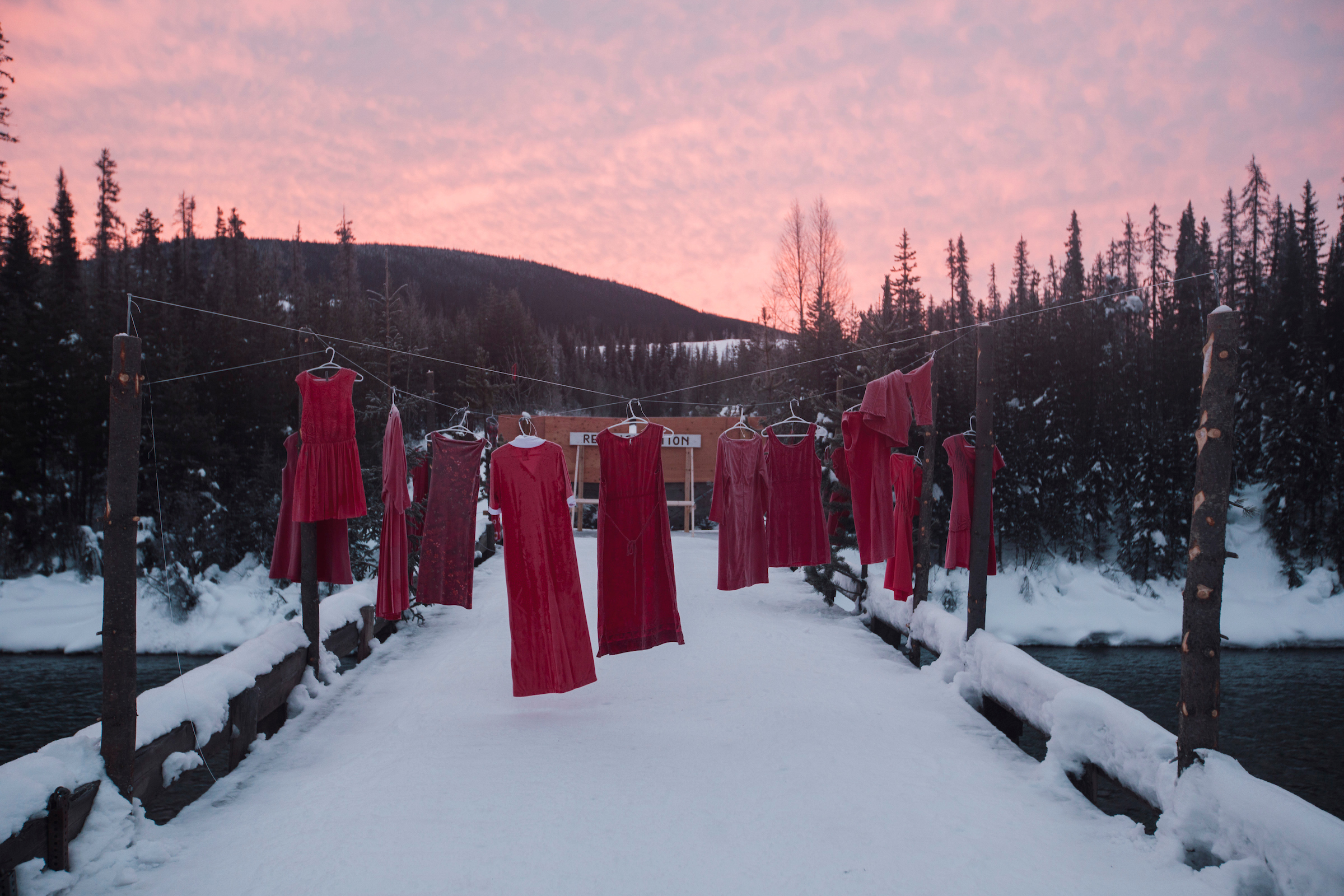
Photographer Amber Bracken — who took this photo of red dresses, which signify Missing and Murdered Indigenous Women and Girls — was recently pulled over by RCMP on Wet’suwet’en territory while working on a story with Métis journalist Brandi Morin. Photo: Amber Bracken / The Narwhal
“I report on violence against our people by police on a regular basis and I felt afraid,” Morin said. She said she later called the RCMP to complain and was told the officers followed them to make sure they got out safe, but she said it was clearly an intimidation tactic.
“I felt it in my spirit and I didn’t like it at all. I had a freaking panic attack that night.”
Wickham said the continued harassment has changed her connection to the territory and is impacting her personal life.
“It used to be so relaxing, and I could feel my body changing the closer to home that we got before all this started — now it’s just stress.”
Updated Feb. 23 at 10:37 a.m. PST: This story was updated to include that Morin and Bracken were on assignment for Al Jazeera.
[Top photo: Wet’suwet’en land defenders gather outside a Coastal GasLink work sitework site on Feb. 14, 2021, for a ceremony to remember Missing and Murdered Indigenous Women and Girls. Photo: Michael Toledano]